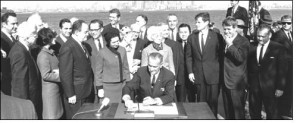
2011
Fall 2011
SOCIOLOGY
Middle Eastern Diasporas, Professor Mehdi Bozorgmehr Soc. 82100
Middle Easterners have been coming to America since the 19th century, but their influx has gained momentum in the last three decades. According to the 2008 American Community Survey released by the U.S. Census, over 2.9 million Americans trace their ancestry to the Middle East. Middle Easterners are the least studied of all major American ethnic groups. Many negative stereotypes (e.g., terrorists, Muslim fundamentalists, hostage takers) are associated with this minority, reinforced by the terrorist attacks of September 11, 2001. This year marks the tenth anniversary of 9/11, making this course even more pertinent. Middle Easterners are among the most diverse of the major ethnic groups in the U.S. and such simplistic stereotypes ignore this diversity (e.g., most Arab Americans are not Muslim). The Middle Eastern American experience is conspicuously absent from courses on immigration and ethnic studies in sociology, anthropology, history and other departments. This course fills this gap by examining the adaptation of Middle Easterners in American society and other host societies. Thus, it will take a comparative approach, first examining all major ethnic groups of Middle Eastern origin, including but not limited to Arabs, Armenians, Iranians, Israelis and Turks; and of course, Muslims and religious minorities. Secondly, the Middle Eastern American experience will be compared and contrasted to those of other regions such as Europe, where they are the largest immigrant group. The interests of students in specific regions and groups will be taken into consideration. The following topics will be covered in this course: • Diaspora and Transnationalism • Theories of assimilation and their application to Middle Easterners in the USA • Exiles (political refugees) vs. economic migrants • Economic adaptation (professionals and entrepreneurs) • Gender and the family • Religion • Ethnicity and ethnic identity • The second generation • Exile politics • Post-9/11 backlash against Middle Easterners and their response
Immigration and American Institutions, Professor Robert Smith Soc. 82300
This course examines the ways that immigrants, and especially the second generation, engage with several American institutions: schools, the political and voting systems, socioeconomic and cultural institutions, and others. The course will analyze how immigrants and the second generation are integrating into American society. Specifically, it will look at schools as institutions for inclusion/exclusion; will consider what political institutions and processes are working towards or against political incorporation of immigrants and later generations; will review how assimilation is taking sometimes unexpected turns in various new immigration destinations in the northeast and southwestern US; and examine how other institutions, such as families and their internal dynamics, affect integration and mobility. The course will give special consideration to the place of undocumented immigrants in American society. Where appropriate, comparisons to European cases will be made.


